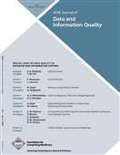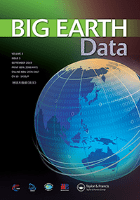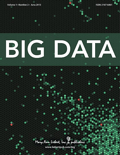
International Journal of Data Science and Analytics
Scope & Guideline
Pioneering Research for a Data-Driven World
Introduction
Aims and Scopes
- Data Analysis and Visualization:
The journal prioritizes studies that explore advanced techniques in data analysis and visualization, aiming to provide insights and enhance understanding of complex data sets. - Machine Learning and Artificial Intelligence:
Research in this area includes the development of novel algorithms, models, and frameworks that leverage machine learning and AI for predictive analytics, classification, and anomaly detection. - Big Data Technologies:
The journal publishes work on the tools and technologies that enable the processing and analysis of large-scale data, addressing challenges associated with big data management and analytics. - Statistical Methods and Theoretical Frameworks:
The journal features papers that contribute to the theoretical foundations of data science, including statistical methodologies that advance the field's analytical capabilities. - Interdisciplinary Applications:
Research that applies data science techniques to various fields such as healthcare, social sciences, finance, and environmental studies is a central theme, showcasing the versatility of data science. - Ethics and Responsible Data Science:
The journal includes discussions on the ethical implications of data science practices, promoting responsible use of data and methodologies in research and applications.
Trending and Emerging
- Deep Learning Innovations:
There is an increasing focus on deep learning techniques, particularly in areas such as image recognition, natural language processing, and time series analysis, reflecting the growing influence of neural networks in data science. - Federated Learning and Privacy-Preserving Techniques:
Emerging research on federated learning indicates a trend towards privacy-preserving data science methodologies, as researchers seek to balance data utility with privacy concerns. - Explainable AI and Model Interpretability:
The rise of explainable AI is evident, with more papers dedicated to enhancing model interpretability, allowing users to understand and trust machine learning decisions. - Applications of Data Science in Healthcare:
Healthcare applications are gaining prominence, with studies focusing on predictive modeling for disease outbreaks, patient outcomes, and personalized medicine, showcasing data science's critical role in improving health outcomes. - Ethics and Fairness in AI:
Research addressing ethical considerations and fairness in AI algorithms is increasingly prevalent, reflecting a broader societal concern regarding bias and discrimination in data-driven decision-making. - Real-Time Data Processing and Stream Analytics:
The focus on real-time data processing techniques has grown, with research exploring methods for analyzing data streams and making instantaneous decisions, particularly in IoT and smart systems.
Declining or Waning
- Traditional Statistical Methods:
There appears to be a decline in the frequency of papers relying solely on traditional statistical methods, as researchers increasingly favor machine learning and computational techniques for data analysis. - Generalized Frameworks without Specific Applications:
Papers proposing generalized frameworks without specific applications or case studies are becoming less common, as the journal's focus shifts towards practical, applied research. - Basic Data Processing Techniques:
There is a noticeable decrease in publications focused on basic data processing techniques, as the emphasis now leans towards more complex and innovative data manipulation and analysis methods. - Narrowly Focused Case Studies:
Research that centers on narrowly focused case studies without broader implications or applications is on the decline, with a growing preference for studies that offer generalizable insights. - Descriptive Analytics without Predictive Elements:
Papers that focus solely on descriptive analytics, without incorporating predictive modeling or machine learning elements, are becoming less prevalent, reflecting the journal's trend towards more advanced analytical approaches.
Similar Journals

ACM Journal of Data and Information Quality
Transforming Insights into Information ExcellenceThe ACM Journal of Data and Information Quality, published by the Association for Computing Machinery (ACM), stands as a distinguished platform for disseminating cutting-edge research in the field of data and information quality. With an impact factor indicative of its scholarly influence, this journal has been pivotal in advancing understanding in Information Systems and Information Systems and Management, as evidenced by its Q2 quartile ranking in 2023. Covering a wide range of topics from data governance to data analytics, the journal aims to bridge theoretical research and practical applications, appealing to a diverse audience of researchers, professionals, and students. The journal's comprehensive scope, along with its ongoing commitment to high-quality submissions since its inception in 2009, ensures that it remains a vital resource for those seeking to enhance their knowledge and expertise in the rapidly evolving landscape of data and information quality.

3c Tecnologia
Advancing innovation in technology and engineering.3c Tecnologia is a premier open-access journal dedicated to the dynamic fields of technology and engineering, published by 3CIENCIAS. With its ISSN 2254-4143, the journal serves as an essential platform for researchers, professionals, and students to disseminate innovative findings and advancements in technologic applications and methodologies. Since its inception in 2012, 3c Tecnologia has fostered a collaborative environment for knowledge exchange, aiming to bridge gaps between theoretical concepts and practical implementations. The journal is accessible to a global audience, ensuring that groundbreaking research is readily available to all. With a commitment to quality and relevance, 3c Tecnologia is positioned as a vital resource within the technological landscape, encouraging contributions that push the boundaries of current understanding and inspire future developments.

Computation
Empowering global research with open-access knowledge.Computation, published by MDPI, is an esteemed open-access journal that has been contributing to the fields of applied mathematics and computer science since its inception in 2013. With an E-ISSN of 2079-3197, this Swiss-based journal operates under a philosophy of free knowledge dissemination, allowing researchers, professionals, and students globally to access high-quality content without financial barriers. Recognized for its rigorous peer-review process, Computation is currently categorized in the Q2 and Q3 quartiles across significant domains, including Applied Mathematics (#181/635), Theoretical Computer Science (#52/130), and Modeling and Simulation (#138/324). As it converges towards 2024, the journal continues to attract innovative and impactful research aimed at advancing theoretical frameworks and practical applications within these disciplines. Joining the Computation community not only enriches individual research portfolios but also contributes to the broader conversation on computational methodologies and their applications in solving real-world problems.

JOURNAL OF UNIVERSAL COMPUTER SCIENCE
Connecting researchers to the forefront of technology.JOURNAL OF UNIVERSAL COMPUTER SCIENCE, published by Graz University of Technology's Institute for Information Systems and Computer Media (IICM), stands as a pivotal resource in the field of computer science. Since its inception in 1994, this Open Access Journal has fostered a culture of knowledge sharing and collaboration, allowing readers from all corners of the globe to access cutting-edge research without barriers. With an impressive convergence of studies spanning from 1996 to 2024, the journal covers a breadth of topics within Computer Science, achieving a Q3 ranking in miscellaneous areas and a Q4 ranking in theoretical computer science as of 2023. It also holds significant standing in Scopus rankings, demonstrating its influence and reach among the scientific community. The journal is particularly valuable to researchers, professionals, and students eager to explore innovative ideas and techniques that push the boundaries of computer science. Based in Austria, the journal is dedicated to maintaining high standards of scholarly integrity while promoting interdisciplinary discourse and advancements in technology.

Informatics-Basel is a leading international, peer-reviewed journal published by MDPI that has been at the forefront of disseminating high-quality research in the field of informatics since its establishment in 2014. Based in Switzerland, this Open Access journal strives to provide a platform for innovative studies across various domains, including Communication, Computer Networks and Communications, and Human-Computer Interaction, demonstrating its strong impact within these fields with impressive rankings: Q1 in Communication and Q2 in both Computer Networks and Communications and Human-Computer Interaction. Researchers and scholars are encouraged to contribute to the advancing dialogue on critical issues and emerging technologies, as evidenced by its esteemed Scopus rankings, placing it in the top percentiles of its respective categories. With its commitment to elevating knowledge accessibility, Informatics-Basel has become an essential resource for the academic community, stimulating collaboration and the sharing of ideas from 2014 to 2024 and beyond.

Big Data Mining and Analytics
Catalyzing Interdisciplinary Collaboration in AnalyticsBig Data Mining and Analytics, published by TSINGHUA UNIVERSITY PRESS, stands at the forefront of interdisciplinary research in the fields of Artificial Intelligence, Computer Networks and Communications, Computer Science Applications, and Information Systems. With an impressive Q1 ranking in multiple categories as of 2023, this journal serves as a critical platform for researchers and professionals eager to explore innovative techniques and methodologies related to big data analytics. Since its transition to Open Access in 2018, Big Data Mining and Analytics has aimed to increase the visibility and accessibility of its cutting-edge research, making permanent strides in the global academic landscape. Housed in Beijing, China, and actively embracing the converged years from 2018 to 2024, the journal aims to cultivate a rich discourse on emerging trends and applications, ensuring its relevance in a rapidly evolving technological environment. Join a vibrant community of scholars dedicated to advancing the frontiers of knowledge in big data.

Advances in Data Science and Adaptive Analysis
Navigating the Future of Data Science Innovation.Advances in Data Science and Adaptive Analysis is a prestigious journal dedicated to the advancement of knowledge within the rapidly evolving fields of data science and adaptive analysis. Published by WORLD SCIENTIFIC PUBL CO PTE LTD, this journal aims to serve as a platform for researchers, professionals, and students to disseminate innovative findings and methodologies. With a focus on interdisciplinary approaches, it invites contributions that explore the application of adaptive techniques in tackling complex data-driven challenges. Situated in Singapore, the journal stands out for its commitment to high-quality research, making significant impacts in the academic community and beyond. Although the journal currently does not offer open access, it remains a crucial resource for those striving to push the boundaries of data science research and its practical applications.

Big Earth Data
Pioneering Research at the Intersection of Earth and ComputingBig Earth Data is a prestigious open-access journal that has been at the forefront of advancing research in the intersection of earth science and computer technology since its inception in 2017. Published by TAYLOR & FRANCIS LTD in the United Kingdom, this journal is dedicated to disseminating groundbreaking findings and innovative methodologies in the fields of Earth and Planetary Sciences and Computer Science Applications. With a commendable impact factor and an impressive positioning in the Scopus rankings—claiming Q1 status in Computers in Earth Sciences and Q2 in Computer Science Applications—it serves as a vital resource for researchers, professionals, and students alike. The journal encourages submissions that explore the integration of big data technologies in managing, analyzing, and visualizing earth-related data, thereby fostering interdisciplinary collaboration. Since embracing its open-access model, Big Earth Data has enhanced the accessibility of high-quality research, promoting a broader dialogue in the scientific community and contributing to informed decision-making in global environmental challenges.

Wiley Interdisciplinary Reviews-Computational Statistics
Pioneering Innovative Solutions in Statistical ApplicationsWiley Interdisciplinary Reviews: Computational Statistics is a leading journal published by WILEY, renowned for its influential contributions to the field of statistics and its application in computational studies. With an impressive impact factor reflected in its 2023 categorization as Q1 in Statistics and Probability, this journal ranks among the top in its category, positioned at 20 out of 278 in Scopus, placing it in the 92nd percentile for its discipline. The journal spans from 2009 to 2024 and offers a rich repository of interdisciplinary insights that encompass both theoretical advancements and practical applications of computational statistics, making it an invaluable resource for researchers, professionals, and students alike. While it does not currently offer open access, the journal's commitment to high-quality, peer-reviewed content ensures that it remains a trusted source for cutting-edge developments and methodologies in the rapidly evolving realm of computational statistics.

Big Data
Leading the way in data analysis and applications.Big Data, an esteemed journal published by MARY ANN LIEBERT, INC, serves as a leading platform within the realms of computer science and information systems. Launched in 2013, this journal has made significant strides in shaping the discourse around the management, analysis, and applications of large-scale data. With a commendable impact factor reflected in its 2023 quartile rankings—Q1 in Information Systems and Management, and Q2 in both Computer Science Applications and Information Systems—Big Data is recognized for its quality and influence, holding a notable position in Scopus rankings. Renowned for its rigorous peer-review process, the journal welcomes original research, reviews, and discussions that address the challenges and innovations associated with big data technologies. Researchers, professionals, and students alike will find Big Data an indispensable resource that not only highlights emerging trends but also fosters collaboration and knowledge sharing within the data science community. Access options are available through institutional subscriptions and individual access, ensuring a broad dissemination of critical research findings.